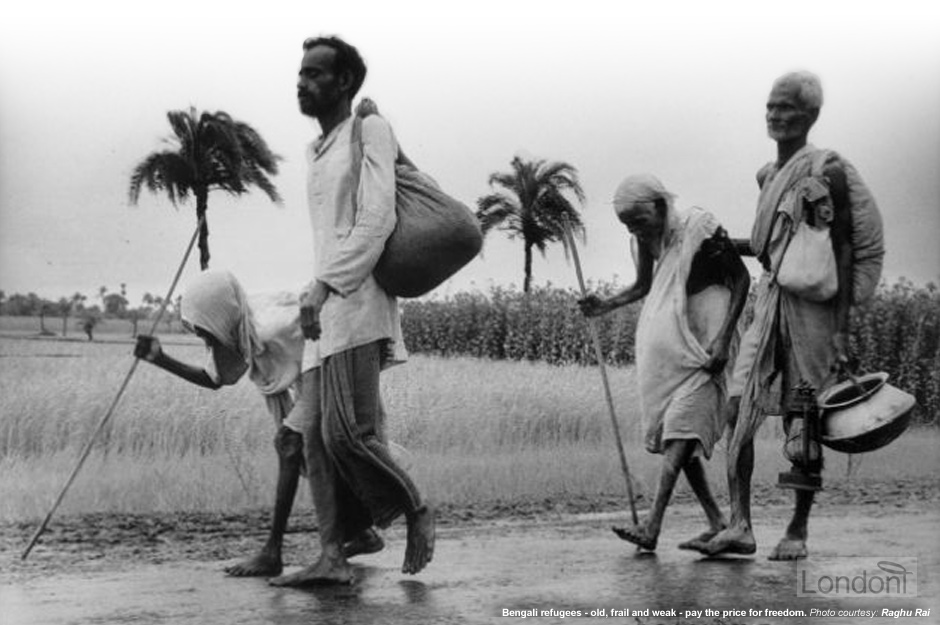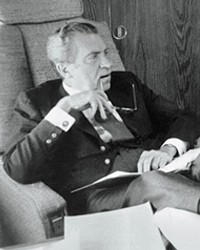
International community show blind eye
Last updated: 5 October 2017 From the section 1971 Muktijuddho
Despite sympathy at the public level, there was no global action to stop the genocide in Bangladesh.
US' Cold War mentality
President Nixon of the United States and his National Security Advisor Dr. Henry Kissinger were using Islamabad as a base for establishing diplomatic ties with Beijing, China, as such they did not want to interfere with the crisis which both US and China viewed as 'internal affair of Pakistan'.
 Richard (Milhous) Nixon (1913 – 1994) 37th President of the United States (1969 - 1974). The only president to resign the office.
Richard (Milhous) Nixon (1913 – 1994) 37th President of the United States (1969 - 1974). The only president to resign the office.  (Heinz Alfred) 'Henry' Kissinger (Born 1923) A German-born Jewish American writer, political scientist, diplomat, and businessman. Served as National Security Advisor and later concurrently as Secretary of State in the administrations of Presidents Richard Nixon and Gerald Ford. Awarded Nobel Peace Prize (1973) along with Vietnamese general Le Duc Tho for the 'Paris Peace Accord', aimed at putting an end to Vietnam War. Le Duc Tho refused the award. Kissinger infamously described Bangladesh as "a basket case".
(Heinz Alfred) 'Henry' Kissinger (Born 1923) A German-born Jewish American writer, political scientist, diplomat, and businessman. Served as National Security Advisor and later concurrently as Secretary of State in the administrations of Presidents Richard Nixon and Gerald Ford. Awarded Nobel Peace Prize (1973) along with Vietnamese general Le Duc Tho for the 'Paris Peace Accord', aimed at putting an end to Vietnam War. Le Duc Tho refused the award. Kissinger infamously described Bangladesh as "a basket case".
The US also viewed the Bangladesh genocide in the context of the Cold War (1946-1991) since their bitter rival Soviet Union were supporting the Bangladesh cause. They feared that the creation of Bangladesh would lead to greater influence of the Soviet Union on the sub-continent and undermine US position in the Indian Ocean region. This fear was further heightened when India and Soviet Union signed the 'Indo-Soviet Friendship Treaty' on 9 August 1971. In Nixon’s and Kissinger's Cold War mentality, India’s refusal to align itself with the United States could only mean that it was a satellite of the USSR. Non-alignment, to them, was not a viable option.
Indian leaders did not think it strange that a country that has distanced itself from most of our foreign policy objectives in the name of nonalignment was asking us to break ties with an ally over what was in international law a domestic conflict.
Henry Kissinger's response to Indira Gandhi's request to stop providing aid to Pakistan in light of the Bangladesh crisis
Nixon and Kissinger were the only two men responsible for the formulation of American policy over the course of the Bangladesh conflict. Neither man, however, ever really understood, or made any effort to understand, the practical regional issues that India faced: its history as a nation, its political realities, or the cultural values of its tremendously diverse society. In particular, they never grasped the deep emotional attachment to the territory of Kashmir that resides within the hearts of the great majority of Indians - not as a stepping stone to hegemony over all South Asia, but as a inalienable part of their own country.
To the contrary, both men, self-inculcated as they were in a global, geopolitical view of the world that saw every event as an integral element of the Cold War, peremptorily dismissed the advice of anyone who did understand. Nixon, in response to an extensive briefing by Kissinger, initiated the "Massive Inaction" policy with a blunt handwritten order: "To all hands: Don’t [underlined three times] squeeze Yahya at this time," as the General relentlessly pursued his campaign of genocide. Nixon complained that every ambassador we sent to India became an "India lover"; Kissinger railed at a State Department "heavily influenced by a traditional Indian bias".
When American Consul Archer Blood and nineteen members of his staff in Dhaka sent a telegram to Washington registering "strong dissent" with its failure to condemn the slaughter, Kissinger accused them of employing "a favorite device of subordinates seeking to foreclose their superiors’ options" by deliberately giving the cables low classification and hence "wide circulation". (In fact, they were sent through the State Department’s "Dissent Channel", specifically set up for just such purposes. Blood was fired for his effort.
Pakistaniaat, a journal of Pakistan studies
China & Arab nations behind Pakistan
China also held the same fear as US, since by the mid-1960s the Sino(Chinese)-Soviet rift had widened greatly that China was trying to warm up relations with the US. As such both nations supported the West Pakistan cause - even though, in the US in particular, the people of those countries were heavily against the Bangladesh oppression.
Pakistan, as a common friend of both the US and China, was acting as a go-between in restoring US-China relations that had soured since the communist takeover in China in 1948. While the Soviet weapons poured into India, China emerged as a major supplier of military hardware for Pakistan.
Likewise, the Arab countries had viewed it as a 'break up' of the largest Muslim state specially since Zulifiqar Bhutto and Yahya Khan propagated this civil war as 'Islamic' West Pakistan versus 'Hindu-influenced' East Pakistan.
Our war was not just India-Pakistan or Bangladesh-Pakistan war, it created international alliance.
Pak-America military pact was very strong. There was also SEATO (Southeast Asia Treaty Organization), CENTO (Central Treaty Organization), also Iran-Turkey-Pakistan pact. There was a secretive, very tight network. So America was blocking [our independence], and the Middle Eastern countries were there too. Iran was then being run by the Shah. Turkey was also involved. So their entire concentration was there [in Bangladesh Liberation War].
India, Soviet & people of the world on Bangladesh's side
In contrast, India, Soviet Union and her allies and general public in UK, Japan, and Western countries stood solidly behind Bangladesh. In fact, it would be India's official participation in the war in December that would lead to victory for the people of Bangladesh. Prior to that the Indian government would aid informally the Mukti Bahinis to fight the war with the West Pakistani soldiers and their Razakar collaborators.
The Government of India also appealed to Pakistan's foreign aiders to block any donation to the country. India had long been one of the most vocal critics of the use of economic and military aid by donor governments to gain political or economic favours from recipients - the "aid without strings" line. In 1971, however, New Delhi was espousing exactly the opposite position in the case of foreign aid to Pakistan, demanding that it be terminated if Pakistan did not change its policies on East Pakistan.
The fragility of international 'friendship' can be viewed in the form of recognition of Bangladesh - within two years (by the end of March 1973) 98 countries recognised the new nation of Bangladesh - almost all important countries, including US. The three main countries which didn't recognise Bangladesh by then were Pakistan, China and Saudi Arabia.
We don't want the Indian to help us. We will win our own country [raising a clenched fist] with our own hands.
